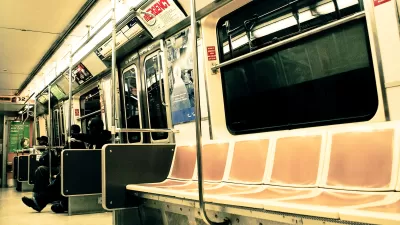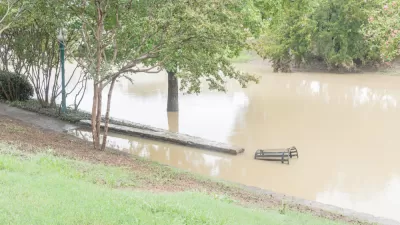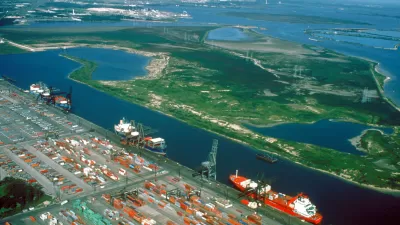While cities race to protect their subway infrastructure from more intense flooding, some experts argue that more investment is needed in more resilient street-level infrastructure.

"Subway systems around the world are struggling to adapt to an era of extreme weather brought on by climate change," write Hiroko Tabuchi and John Schwartz. "Their designs, many based on the expectations of another era, are being overwhelmed, and investment in upgrades could be squeezed by a drop in ridership brought on by the pandemic." In cities around the world, aging subway systems are being overwhelmed by worsening floods. "In New York, the Metropolitan Transportation Authority has invested $2.6 billion in resiliency projects since Hurricane Sandy swamped the city’s subway system in 2012, including fortifying 3,500 subway vents, staircases and elevator shafts against flooding."
Yet some experts argue that protecting subways may be a misguided approach. "With more extreme flooding down the line, protecting subways all of the time will be impossible, they say. Instead, investment is needed in buses and bike lanes that can serve as alternative modes of public transportation when subways are flooded. Natural defenses could also provide relief. Rotterdam in the Netherlands has grown plants along its tramways, enabling rainwater to be soaked up by the soil, and reducing heat." Bernardo Baranda Sepúlveda, a Mexico City-based researcher at the Institute for Transportation and Development Policy, says that "[s]treet-level light rail, bus systems and bicycle lanes aren’t just less exposed to flooding, they are also cheaper to build and easier to access."
FULL STORY: Climate Crisis Turns World’s Subways Into Flood Zones

Maui's Vacation Rental Debate Turns Ugly
Verbal attacks, misinformation campaigns and fistfights plague a high-stakes debate to convert thousands of vacation rentals into long-term housing.

Planetizen Federal Action Tracker
A weekly monitor of how Trump’s orders and actions are impacting planners and planning in America.

Chicago’s Ghost Rails
Just beneath the surface of the modern city lie the remnants of its expansive early 20th-century streetcar system.

Bend, Oregon Zoning Reforms Prioritize Small-Scale Housing
The city altered its zoning code to allow multi-family housing and eliminated parking mandates citywide.

Amtrak Cutting Jobs, Funding to High-Speed Rail
The agency plans to cut 10 percent of its workforce and has confirmed it will not fund new high-speed rail projects.

LA Denies Basic Services to Unhoused Residents
The city has repeatedly failed to respond to requests for trash pickup at encampment sites, and eliminated a program that provided mobile showers and toilets.
Urban Design for Planners 1: Software Tools
This six-course series explores essential urban design concepts using open source software and equips planners with the tools they need to participate fully in the urban design process.
Planning for Universal Design
Learn the tools for implementing Universal Design in planning regulations.
planning NEXT
Appalachian Highlands Housing Partners
Mpact (founded as Rail~Volution)
City of Camden Redevelopment Agency
City of Astoria
City of Portland
City of Laramie





























